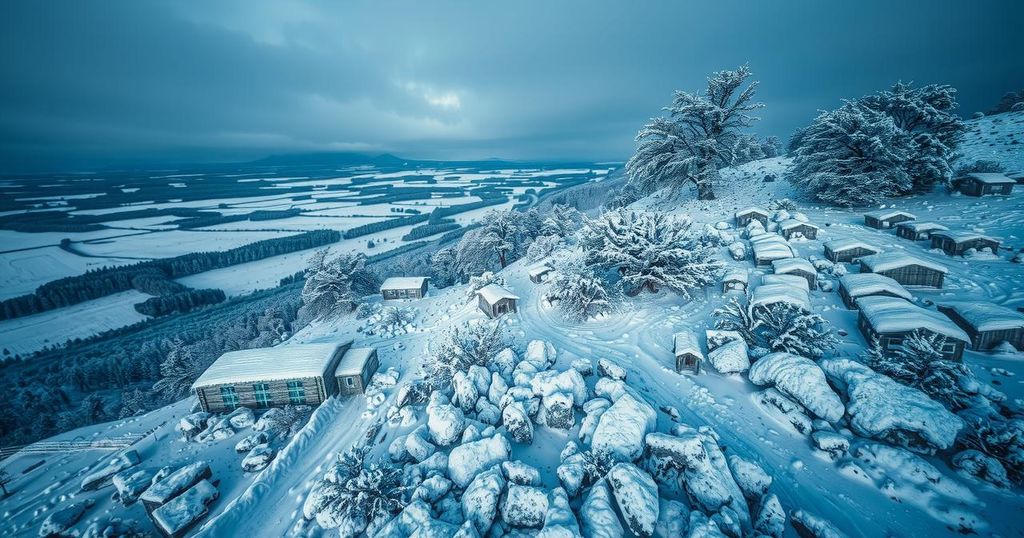Snowfall in Africa: A Look at Seven Countries With Winter Landscapes
In Africa, snowfall is an unexpected yet fascinating phenomenon attributable to specific high-altitude regions. This article highlights seven nations where snow is observed: South Africa, Morocco, Lesotho, Tanzania, Uganda, Algeria, and Ethiopia. Each of these nations offers unique landscapes that transform into winter wonderlands during specific seasons, illustrating the continent’s climatic diversity.
Snowfall in Africa is an occurrence that often surprises, as the continent is generally associated with warm climates. Nonetheless, certain nations within Africa experience snowfall owing to their unique geographical attributes and elevations. During winter months, selected areas transform into snowy landscapes that are both captivating and inviting for exploration. This phenomenon illustrates the diverse climates that exist across Africa, challenging conventional perceptions and highlighting the continent’s rich variety of natural environments. The following are seven African nations known for experiencing snowfall: 1. South Africa: Although predominantly warm, specific regions such as Gauteng, parts of Johannesburg, the Drakensberg Mountains, and select areas in the Western Cape do experience snowfall during winter, presenting an unexpected icy perspective of the nation. 2. Morocco: Known for its varied landscapes, Morocco experiences regular snowfall predominantly in the Atlas Mountains, particularly within the High Atlas and Middle Atlas ranges. The town of Ifrane is renowned for its picturesque winter scenery, often attracting visitors seeking to enjoy its Swiss-like charm. 3. Lesotho: This landlocked nation, uniquely positioned with all its territory above 1,000 meters in altitude, sees frequent snowfall in winter months, creating enchanting winter wonderlands for both residents and visitors alike. 4. Tanzania: Snowfall is notably observed on Mt. Kilimanjaro, Africa’s highest peak. Although many regions encounter cool temperatures, the summit plunges into arctic conditions, especially from mid-June to October. Heaviest snowfall often occurs in December, while the coldest months are June, July, and August, drawing numerous climbers eager to experience its polar climate. 5. Uganda: Snowfall is primarily noted on the peaks of the Rwenzori Mountains, where snow and glaciers envelop the summits, presenting a stunning contrast to the lush surroundings and attracting adventurers and nature enthusiasts alike. 6. Algeria: Although snow is rare in the predominantly arid climate of Algeria, the Tell Atlas does experience snowfall in winter, particularly in northern mountainous regions such as Kabylie and the Aurès Mountains. For locals, snowfall signifies a refreshing deviation from their typical dry climate. 7. Ethiopia: With its diverse terrain, certain Ethiopian regions also occasionally witness snowfall. The Simien Mountains, which are recognized as a UNESCO World Heritage Site and exceed 4,500 meters in elevation, are among the select areas that experience this phenomenon, appealing particularly to hikers and explorers.
The phenomenon of snowfall in Africa counters the common misconception that the continent is predominantly warm, showcasing its climatic diversity. This article explores the specific geographical and climatic conditions that enable certain regions of Africa to experience snowfall. By examining high-altitude areas and their unique environmental factors, the article demonstrates the rich variety of climates present across the continent, inviting further exploration of these extraordinary regions in Africa that see such rare weather patterns.
In conclusion, while snowfall in Africa may be rare, it does occur in select regions due to unique geographical characteristics and elevations. Countries such as South Africa, Morocco, Lesotho, Tanzania, Uganda, Algeria, and Ethiopia showcase diverse climates that defy the conventional understanding of the continent’s weather. This rarity not only invites curiosity and exploration but also serves to emphasize Africa’s natural diversity.
Original Source: businessday.ng




Post Comment